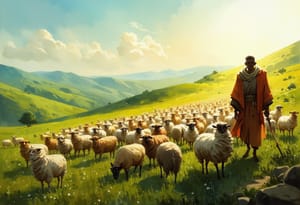| Series | Sheep and Shepherds |
|---|---|
| Theme | Sheep and Shepherds - Mamoe ma leoleo mamoe |
| Colour | Lanu Meamata |
| Special Day | Aso Sa o Tupulaga (Youth Sunday) |
Scripture Focus: 2 Samuelu 12:1-6
Yahweh sent Nathan to David. He came to him, and said to him, “There were two men in one city; the one rich, and the other poor. The rich man had very many flocks and herds, but the poor man had nothing, except one little ewe lamb, which he had bought and raised. It grew up together with him, and with his children. It ate of his own food, drank of his own cup, and lay in his bosom, and was to him like a daughter. A traveler came to the rich man, and he spared to take of his own flock and of his own herd, to dress for the wayfaring man who had come to him, but took the poor man’s lamb, and dressed it for the man who had come to him.” David’s anger was greatly kindled against the man, and he said to Nathan, “As Yahweh lives, the man who has done this is worthy to die! He shall restore the lamb fourfold, because he did this thing, and because he had no pity!”
- 2 Samuel 12:1-6 (WEB)
Study:
This parable, delivered by Nathan the prophet, is a powerful indictment of David’s sin with Bathsheba. David, a king accustomed to taking what he wanted, easily identified with the injustice suffered by the poor man. He readily condemns the rich man’s actions, unaware he is condemning himself. The lamb wasn't just an animal; it was a cherished part of the poor man’s family, treated with immense affection. This highlights the cruelty of taking something deeply loved and valuable from someone vulnerable. David's immediate and strong reaction reveals his innate sense of justice, but it's tragically misplaced until Nathan reveals the truth: “You are the man!” This story underscores that our actions have consequences, even when we don’t immediately recognize them.
Application:
We, like David, can be blind to our own failings. We may quickly judge others while excusing similar behaviors in ourselves. This parable challenges us to examine our own hearts and identify areas where we might be exploiting the weak or taking advantage of others, even in small ways. Are there resources, opportunities, or possessions we should be sharing instead of hoarding? Are we valuing people and relationships more than material gain? It is a good time to reflect on our treatment of those who have less power or privilege than we do, and how we can live with more compassion and justice. As Youth, are your actions reflecting love, compassion and justice?
Reflection Questions:
- How does this parable challenge your own sense of justice?
- In what areas of your life might you be acting like the ‘rich man’ in the story?
- How can you show greater empathy and compassion to those less fortunate?
- What does it mean to consider the emotional value someone places on something, not just its monetary worth?
- As youth, How can we advocate for justice and fairness in our community?
Prayer:
Dear Lord, forgive us for the times we have failed to see our own sin and have been quick to judge others. Help us to cultivate hearts of compassion and to act with justice and fairness in all our dealings. Open our eyes to the needs of those around us, and empower us to be instruments of your peace and love. Amen.
Tags: 2 Samuel, David, Nathan, parable, justice, compassion, sheep, shepherd, sin, repentance, Youth, Aso Sa o Tupulaga
